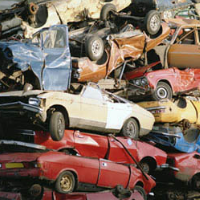Toxic Scrap Yards Traffic in Stolen Goods with Virtually No Oversight

The scrap business is booming in Southern California, where a $7 billion metal export trade keyed to the ports of Los Angeles and Long Beach has spawned a proliferation of legal and illegal operations with virtually no oversight by government officials.
There are pretty much only two law enforcement officials in all of Los Angeles County charged with keeping tabs on an unknowable number of businesses that are trafficking in everything from stolen park statues to torn up train tracks, according to reports in the Los Angeles Times.
One of those two officials, Los Angeles Police Department Detective Kevin Romine, estimates that half the metal found in scrap yards, other than iron, has been stolen.
It’s not that California has been lax in laying down the law to contain the illegal behavior. The state passed legislation four years ago requiring photo IDs from scrap sellers and three-day waiting periods before sales are finalized. It just hasn’t funded enforcement.
State and local governments require a host of permits to operate scrap yards, including permits for discharge of runoff water into storm drains, air emissions, electronic waste and recycled appliances.
But the patchwork of agencies that oversee the permit processes don’t communicate much with each other and rarely conduct inspections. A survey by Los Angeles County officials in 2010 found that half the scrap yards in one unincorporated area didn’t have land-use permits.
That not only leads to heavy traffic in stolen goods, but operations that regularly flaunt environmental health and safety laws. Hazardous materials are crushed, blowtorched and otherwise recycled, often in residential neighborhoods, without concern for air pollution and toxic runoff.
A 2008 report by the FBI found that copper thieves threatened critical U.S. infrastructure by stripping cellular towers, water wells, construction sites, vacant homes, electrical substations and telephone land lines and reselling the metal. The report noted that the town of Jackson, Missouri, was put at high risk when warning sirens failed to alert the city that a tornado was approaching because thieves had stolen the copper wiring.
The FBI warned then that the downturn in the U.S. economy and its accompanying foreclosure crises, coupled with a boom in some Asian markets, were creating new opportunities for organized theft rings wreak havoc.
Four years later, there are no indications that law enforcement has increased.
–Ken Broder
To Learn More:
Illegal Scrap Yards in California a Burgeoning Problem (by Jessica Garrison, Los Angeles Times)
Metal Recycling Firms Burgeon in State, but Regulators Can't Keep Up (by Jessica Garrison, Los Angeles Times)
Copper Theft Threatens U.S. Critical Infrastructure (Federal Bureau of Investigation)
Scrap Metal Cowboys (by Paul Kedrosky and Gregor Macdonald, Gregor.us)
- Top Stories
- Controversies
- Where is the Money Going?
- California and the Nation
- Appointments and Resignations
- Unusual News
- Latest News
- California Forbids U.S. Immigration Agents from Pretending to be Police
- California Lawmakers Urged to Strip “Self-Dealing” Tax Board of Its Duties
- Big Oil’s Grip on California
- Santa Cruz Police See Homeland Security Betrayal in Use of Gang Roundup as Cover for Immigration Raid
- Oil Companies Face Deadline to Stop Polluting California Groundwater





